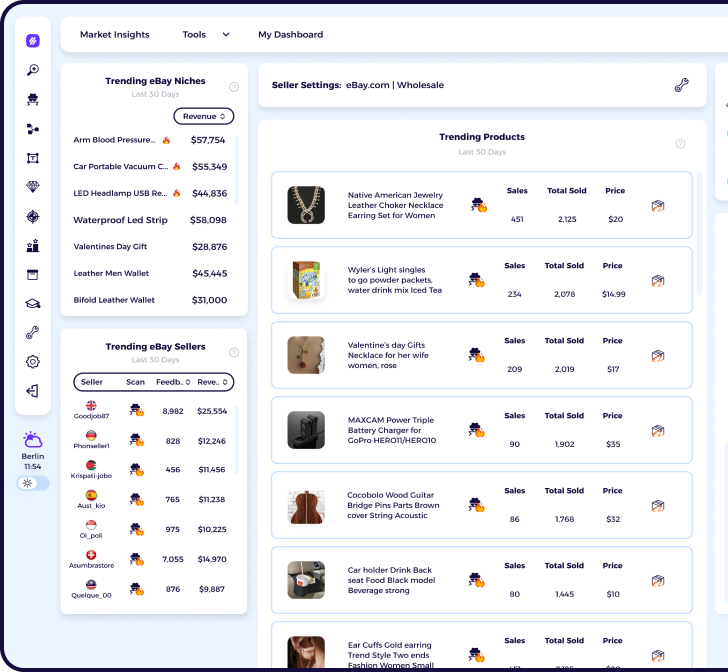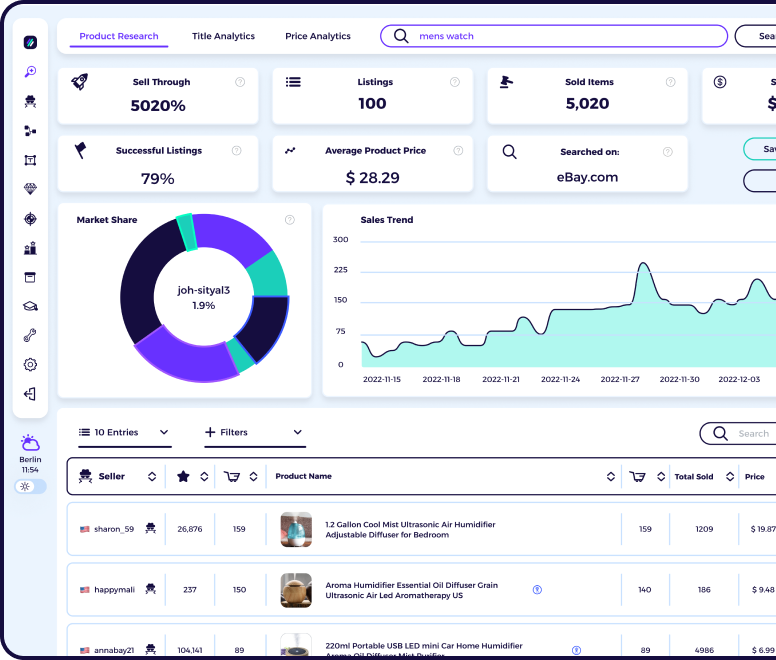So, you want to start your own online store? The first decision you must make is to find an ecommerce platform that meets your requirements for an ecommerce site. There is an overwhelming array of choices, but two names emerge among the frontrunners: Shopify vs BigCommerce.
Shopify is a popular ecommerce platform launched in 2004. There are currently over 1 million Shopify stores and websites that are live on the web. Aspiring store owners choose Shopify as an ecommerce solution because of its user-friendly interface, easy website builder capabilities that require no coding or web design skills, and solid SEO features.
On the other hand, BigCommerce is an agile contender for recognition as the best ecommerce website builders praised for its robust features and scalability.
Whether you’re new to setting up an ecommerce site or expanding your online business, it pays to know the difference between Shopify vs BigCommerce to help you make an informed decision. So before you step into the online business game, ensure you are armed with the information you need about each ecommerce platform.
Article Overview:
Shopify vs BigCommerce Overview
Shopify vs BigCommerce: Comparison
Pricing
Enterprise Plans
Themes & Designs
Transaction Fees
Features
Payment Gateways
Sales & Marketing
Inventory Management
Customer Support
Shopify vs BigCommerce: Final Thoughts
FAQs
Shopify vs BigCommerce Overview
Before you can build an online store, you need a platform and tools to help make your ecommerce dream a reality. This is where ecommerce platforms like BigCommerce Shopify enter the picture.
Both Shopify and BigCommerce are the same in that they offer hosted ecommerce solutions. What does a hosted ecommerce site mean?
Installing software to use these ecommerce platforms to build your online store is unnecessary. In addition, you don’t need to buy hosting and can access your online store from anywhere on the web. Moreover, there is no coding required for each of these ecommerce platforms. It’s a huge relief for store owners who don’t have the coding and web design skills or cannot afford to hire a professional website designer to build their ecommerce store for them.
You must choose BigCommerce or Shopify themes to suit your website brand and the industry. Those free themes are available for you, but you can also find paid themes if you want more customizable options for your website design.
In theory, you have to choose your Shopify or BigCommerce plans, pick your themes, and you’re all set to launch your online store!

Shopify is the bigger ecommerce platform of the two. It has been around longer since the early 2000s. Shopify offers ecommerce solutions for nearly 5 million websites, while BigCommerce sites are currently at a little over 45,000 (although that number is growing by the day). Since both Shopify and BigCommerce are ‘software as a service’ (SaaS) platforms, using their services will require ongoing costs–and keeping your online store live!

To choose between Shopify vs BigCommerce, let’s dive deeper into the specific features and capabilities of each ecommerce platform. You can compare BigCommerce to Shopify objectively using these key factors that would help easily set up your ecommerce site.
Shopify vs BigCommerce: Comparison
If you’re launching an online store, use this detailed comparison between Shopify and BigCommerce to choose the better platform confidently.
Pricing
Pricing is often the primary factor to consider when choosing an ecommerce solution for an online store. It doesn’t matter how good the features and capabilities of a product are if it’s beyond your budget’s reach.
The options for a Shopify plan allow you to subscribe monthly or annually (with discounts of 25%). Four Shopify pricing plans are available: Starter, Basic, Shopify, and Advanced. The Shopify Plus plan is an alternative solution for large, high-volume businesses requiring more support and advanced capabilities.
You can enjoy a free trial with Shopify for 14 days before you sign up for your chosen Shopify plan. Here is an overview of the Shopify pricing plans:

- Starter – $5 per month
- Basic – $25 per month ($19 per month annually)
- Shopify – $65 per month ($49 per month annually)
- Advanced – $399 per month ($299 per month annually)
- Shopify Plus – $2,000 per month
The Shopify Pricing page provides more detailed information about the inclusions for each Shopify plan to help you pick according to your budget and needs.
The BigCommerce pricing also offers the option to subscribe monthly or annually. With BigCommerce, the free trial period is 15 days. Here is an overview of the BigCommerce pricing to help you pick the right BigCommerce plan for your online business.

- Standard – $39 per month ($29 per month annually)
- Plus – $105 per month ($79 per month annually)
- Pro – $399 per month ($299 per month annually)
- Enterprise – Available at custom BigCommerce pricing to suit the scale of your online business needs.
You can visit the BigCommerce pricing page to learn more about the specific inclusions for each BigCommerce plan and help you make the right choice for your needs.
Enterprise Plans
In addition to the Shopify pricing and BigCommerce pricing information, inspecting the enterprise plans more closely is crucial. This feature is available for high-volume sellers and store owners of major businesses. As the name implies, these plans are enterprise-grade versions, and it is important to examine their capabilities before you choose these more expensive plans.

So, why choose the Shopify or BigCommerce enterprise plans? You will have guaranteed server uptime, advanced support, advanced security features and tools, and the ability to set up multiple online stores. Hence, these Shopify and BigCommerce plans are worth the investment.

For enterprise plans, the pricing is customizable to match the requirements of your online business.
Themes & Designs
Once you have chosen a suitable pricing plan for your ecommerce site, you can start looking into paid or free themes from Shopify and BigCommerce. Your website will serve as your online storefront; therefore, making it as visually appealing for your customers as possible makes sense.
Your choice of themes will determine how you can customize the design to reflect your brand, aesthetic, and industry. There are 9 free Shopify themes and 12 BigCommerce free themes. But if you want more customization options, you can choose the paid Shopify and BigCommerce themes. Shopify offers more themes as they have a larger third-party developer system to tap into. The Shopify theme store is the best place to go if you want to find the best theme for your ecommerce store.
In terms of quality and design, the Shopify themes are more polished and professional-looking. However, the BigCommerce themes are catching up, and you have more options available than previously.
Shopify wins in the design and themes department regarding quality and having a larger selection of Shopify themes.
Transaction Fees
If you are setting up an ecommerce store, you are running an online business. And the goal for store owners is to maximize profit for every sale. That’s why it is essential to check the transaction fees for Shopify and BigCommerce to help you determine the right ecommerce platform solution for your business.
BigCommerce wins in the fees department because they take 0% from each transaction or sale. The 0% transaction fee is available to all BigCommerce plans, not just the BigCommerce enterprise plans.

On the other hand, Shopify offers 0% transaction fees on all plans (except the Starter one), but only if you use Shopify Payments. That said, Shopify will charge you the transaction fee if you use an external payment gateway. And how much cut will they take from each sale?
It depends on the Shopify plan you are subscribed to. It is 2% for Basic Shopify, 1% for Shopify, and 0.5% for Advanced Shopify. The Starter plan has a fixed 5% transaction fee, regardless if you use other payment gateways or Shopify Payments.
Features
While the quality and capabilities of the features provided are more important, it’s essential to compare Shopify and BigCommerce based on the features available out of the box.
BigCommerce wins in this department. It offers more features and functionalities than Shopify, which explains the lack of third-party apps integration when you use BigCommerce as an ecommerce platform. You can integrate a third-party plugin into your ecommerce store if there are any missing features. But keep in mind that third-party plugins do have costs involved.
Here is a list of the similar features available to both Shopify and BigCommerce:
- Unlimited products and orders
- Unlimited bandwidth
- 24/7 support
- Drag-and-drop ecommerce website builders
- Shopping cart functionality
- Bigcommerce and Shopify POS
- Mobile optimized online store
- Multiple payment gateway and processing solution
- Customer accounts
- Shipping integrations
- Tax calculation
- SSL integration
- Social media selling
- Inventory management
- Search engine optimization
- Sales and analytics reporting
Payment Gateways
A payment gateway is another important consideration when choosing an ecommerce platform for your online store. It is responsible for processing payments from your customers. Your priority is to offer multiple payment gateways to make it convenient for your customers to pay for their orders.
Shopify and BigCommerce offer an extensive array of payment gateways, which you can add to your ecommerce store. However, the availability of certain payment gateways might vary from country to country (or region to region). But the good news is that both ecommerce platforms offer the major payment gateways, such as Paypal and Stripe.
But for the sake of comparison, Shopify offers more payment gateways than BigCommerce (almost double the quantity). Many online shoppers don’t like to fiddle with new payment processing options, so they are likely to use the one they’re familiar with and find convenient. This emphasizes the need to offer more payment gateways on your ecommerce site.
Sales & Marketing
Sales and marketing are crucial considerations when setting up an ecommerce store. Without sales and marketing tools, you will find it difficult to generate sales for your online business. Thankfully, Shopify and BigCommerce offer various sales and marketing features to increase visibility for your online store.
BigCommerce has a Channel Manager, which you can use to facilitate multi-channel sales and boost your sales performance. You can easily sell through various platforms and online marketplaces with a simple connection process.
Shopify also simplifies the management of various online sales channels. Once you connect a sales channel to Shopify, it becomes easier to keep track of customer orders, manage inventory, and monitor your sales performance. Shopify offers easy integration with third-party apps, making generating sales easier across multiple channels.
Speaking of third-party integrations, whether you choose Shopify or BigCommerce for your ecommerce site, investing in a reliable market and product research tool is important. This tool arms you with information on how to find trending products, perform keyword research, and optimize your product listing to optimize sales performance. You can leverage these tools to ensure your online storefront meets industry-standard SEO practices like title optimization, product description optimization, and adding images to your listings.
The more you can utilize the marketing and SEO tools from a third-party solution and the available tools within Shopify and BigCommerce, the more you can be confident that you’ll hit your sales target.
Inventory Management
Inventory management is important when you’re running an online business. If you want to maintain your sales performance and keep up with customer product demand, you should know how to effectively manage your inventory (or have tools to enable it).
Shopify wins here because of the sheer volume of inventory locations they offer – up to 1,000! The massive inventory location is available on all Shopify plans (except Starter). These inventory locations can be local warehouses, retail stores, and more. The inventory management tool within Shopify makes it easier to identify which locations have the stock for your desired product and at what amount. Therefore, it helps store owners stay on top of their customer orders to ensure they have stocks available when customers order them.
A reliable inventory management system like this can remove any headache from running an online store and deliver a positive customer experience. If that’s not enough, Shopify has introduced its smart routing rules. If you have inventory in two separate locations, the smart routing rules enable you to identify the availability of stocks in the nearest location to facilitate faster order processing, fulfillment, and delivery.
BigCommerce does have an inventory management tool available. However, their inventory locations are considerably smaller than what Shopify offers.
Customer Support
Understanding the level of support available to Shopify and BigCommerce helps you pick the best platform for your business. It is vital to your ecommerce store building experience because you want the support you need when encountering issues.
Both Shopify and BigCommerce offers the same level of support through live chat, email, and phone support. These websites have forums, FAQs, and help articles to provide guidance in using the website and its features.
These two platforms offer 24/7 support, which shows the commitment to help with issues resolution in a prompt manner.
Shopify vs BigCommerce: Final Thoughts
So, which is better: Shopify vs BigCommerce? The answer is it depends on your needs.
Choose BigCommerce if you want to avoid transaction fees and state-of-the-art reporting (even on the basic and cheapest BigCommerce plan). Overall, the platform is cheaper than Shopify, and you can create multiple online stores.
On the other hand, choose Shopify if you want professional and beautiful themes, excellent inventory management, and international selling tools. Shopify also boasts solid SEO features, making optimising your business and increasing visibility easier. If you like adding third-party integrations to your store, you can do that with Shopify. Finally, Shopify has built a reputation as a solid ecommerce platform and is the preferred solution for many store owners.
FAQs
Is Shopify better than BigCommerce?
Shopify wins over BigCommerce overall. While there are several emerging competitors, Shopify has more built-in features suited for online stores of any size. While BigCommerce has some advantages, it misses out on other key aspects that an online business would need to thrive and survive.
Is Shopify cheaper than BigCommerce?
It depends on which Shopify or BigCommerce plans you choose for your online business. You can get discounts if you opt for the annual subscription. Both BigCommerce and Shopify offer discounts for choosing an annual subscription. It depends on your needs to find a more cost-effective choice in this BigCommerce vs Shopify battle.
Is BigCommerce good for small business?
Yes, BigCommerce offers a low barrier of entry for aspiring online store owners with the cheapest BigCommerce plan suited for new and small businesses. But as the name implies, the ecommerce solutions through this platform can be leveraged for high-revenue and high-volume businesses.
Does BigCommerce integrate with Shopify?
Yes. Bigcommerce is compatible with Shopify, allowing you to receive order details from Shopify from BigCommerce directly.
Should I use BigCommerce or Shopify?
It depends on your online business goals and where you are in your online selling journey. Choose Shopify if you have a B2C business model, while BigCommerce is ideal for large B2B businesses.
Want to review our other Shopify comparison articles?
Check out our comparisons of Shopify vs:
- 3dcart
- Big Cartel
- BigCommerce
- ecwid
- Magento
- Neto
- OpenCart
- osCommerce
- PrestaShop
- PrestaShop
- shopify plus
- Squarespace
- Volusion
- Weebly
- Wix






